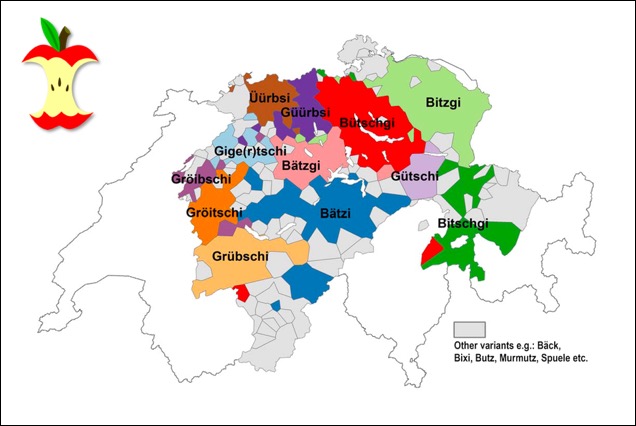On my first post, I mentioned that Swiss from the German part of the country learn Standard German* at school as their first language. But, if you ask them, there is a high chance you will hear that Standard German is their second language and whatever dialect of Swiss German they speak at home is their first.
According to a study published by the Bundesrat für Statistik in 2017, 96% of Swiss living the German part of the country speak Swiss German in a regular basis. And a (very) informal non-statistical “study” conducted by myself among the people I know indicates that they actually prefer to speak Swiss German rather than the Standard German. So…
Why doesn’t Switzerland make Swiss German an official language?
Different factors weigh into the answer, but I think two of them provide a good summary.
The first one is, as you might have noticed, the fact that there isn’t such a thing as one Swiss dialect. There are many many MANY different(ish) dialects of Swiss German. They can all understand each other to a certain extend, but it’s undeniable that there are differences as well. Check the map below. Those are the different ways to say apple core in Swiss German. Ok, apple core might not be something you say on a daily basis, but this also happens to more useful words. If you are interested, Dialäkt Äpp mapped some words.

The second one is that people are in general (again according to my non-statistical informal “study”) very proud of the version they speak. Therefore, no one is very keen on having someone else’s dialect imposed as THE Swiss German. So even if there was a common agreement that Swiss German would become an official language, can you imagine the endless debates around which one of the current dialects would be the chosen one?
And this, raised another question.
Why did they choose Standard German as an official language?
Let me better explain myself.
At one point in time, someone, somewhere, somehow decided that instead of trying to unify all the Swiss German dialects it would be easier, faster, better to adopt Standard German as the official language of the German part of the country. But, if Swiss Germans prefer to speak their own dialect and don’t feel super comfortable speaking Standard German, what prevented one of the other official languages of taking the place of Standard German?
Unfortunately, I was not able to find an answer for that question. I’m sure it’s out there, but in (one of the many variations of) German. And right now, I’m not even able to make a reservation in (any variation of) German, let alone read articles about linguistic history. But, as everything else in life, there is also a positive side to it. I’ll definitely use this question as a conversation starter next time I meet a local. Who knows if it won’t be that one person who is crazy about history and linguistics…
Perhaps, dear reader, you know the answer! Or even have a wild guess. Or don’t care and would rather read about other “but wait, what” moments. Anyway, leave a comment and let me know!
*Despite most people saying High German, the use of such term in this context can be considered incorrect due to many complicated linguistic reasons which I don’t feel comfortable writing about (because I’m an Engineer studying Marketing), but here is some background information on the German language in case you are curious.



Highly enjoyable read! So, let me give you my answer to this. Unifying the dialects doesn’t work for the same reason standardising all European countries doesn’t.. just that most of them didn’t seem to notice (: Also, it feels weird to try and write something in any dialect other than your own. Much weirder than writing something in German.
I say “Betzgi” (Lucerne dialect), shame on Watson for not doing their research in sufficient depth.
Have fun on your discovery journey!
TKs for the contribution, Luca. And for corroborating for my highly non-statistical study!
Regarding Betzgi, if you download the app, you can actually suggest new words and pin where you heard on the map.
Perhaps you should put Lucerne on the dialects map.